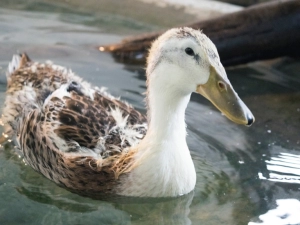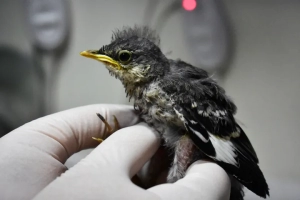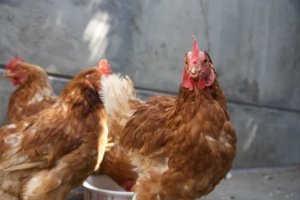With Avian Influenza circulating, here’s how to help protect birds

Highly Pathogenic Avian Influenza, known as HPAI, has landed in Southern California. HPAI affects both domestic and wild birds, and the threat of HPAI has caused serious concern. Pasadena Humane cares for both domestic and wild birds and has implemented biosecurity measures to prevent the bird flu from spreading at the shelter. For more resources and tips on preventing the spread of HPAI at pasadenahumane.org/hpai.
A few weeks ago, our Animal Care and Control Officers were called out to a private pond where multiple geese had been found dead. Testing revealed the cause of death was HPAI, the first confirmed case of the pathogen in Pasadena.
Pasadena Humane’s health and wildlife teams have been carefully watching the migration of this deadly illness over the past year, while working closely with state and local health agencies in preparation for its arrival here.
HPAI affects both domestic and wild birds, and the threat of HPAI has caused serious concern. Pasadena Humane cares for both domestic birds, such as chickens and cockatiels, as well as wild birds like hawks, cormorants, and finches.

Highly Pathogenic Avian Influenza, known as HPAI, has landed in Southern California. HPAI affects both domestic and wild birds, and the threat of HPAI has caused serious concern. Pasadena Humane cares for both domestic and wild birds and has implemented biosecurity measures to prevent the bird flu from spreading at the shelter. For more resources and tips on preventing the spread of HPAI at pasadenahumane.org/hpai.
Recently Dr. Pyrdek was asked to present Pasadena Humane’s HPAI protocols at the California Certified Wildlife Rehabilitation Conference to help other organizations identify potential weaknesses and better protect against the spread of HPAI.
Pasadena Humane continues to work closely with local public health departments, the California Department of Fish and Wildlife, and the California Department of Food and Agriculture to report and test any suspicious cases and share best practices in disease control.
Here are some ways you can help protect birds and control the spread of HPAI:
As the first line of defense against HPAI spreading at our shelter, we recommend that anyone who needs to rehome their pet bird first try pet rehoming. And, for wild birds in need of assistance, contact our Wildlife Helpline at for expert guidance before touching the bird or bringing the bird to the shelter.
To reduce cross contamination in the community, remove bird feeders and bird baths. Feeders and baths encourage multiple species of birds to congregate together, making it easier for the disease to spread.
Keep cats indoors to prevent contact with infected birds. Walk your dog on a leash and avoid direct exposure to waterfowl and their feces.
Pet birds should be kept indoors and have no contact with other birds. Wash your hands thoroughly before and after handling your bird. If you notice any signs of illness, contact your veterinarian immediately.
If you own chickens, do not allow visitors into your chicken coop. Keep your birds in confined housing with a solid roof and walls, and wear dedicated clothing and shoes in the chicken’s housing areas.
For tracking purposes, report sick or dead birds to the appropriate state authorities. For domestic birds, contact the California Department of Food and Agriculture’s hotline at . Wild Birds should be reported to the California Department of Fish and Wildlife at or https://wildlife.ca.gov/Conservation/Laboratories/Wildlife-Health/Monitoring/Mortality-Report.

Highly Pathogenic Avian Influenza, known as HPAI, has landed in Southern California. HPAI affects both domestic and wild birds, and the threat of HPAI has caused serious concern. Pasadena Humane cares for both domestic and wild birds and has implemented biosecurity measures to prevent the bird flu from spreading at the shelter. For more resources and tips on preventing the spread of HPAI at pasadenahumane.org/hpai.
For more resources and tips on preventing the spread of HPAI, visit pasadenahumane.org/hpai.
Dia DuVernet is president and CEO of Pasadena Humane.
This blog post originally appeared as a column in the Pasadena Star-News on November 19, 2022.


